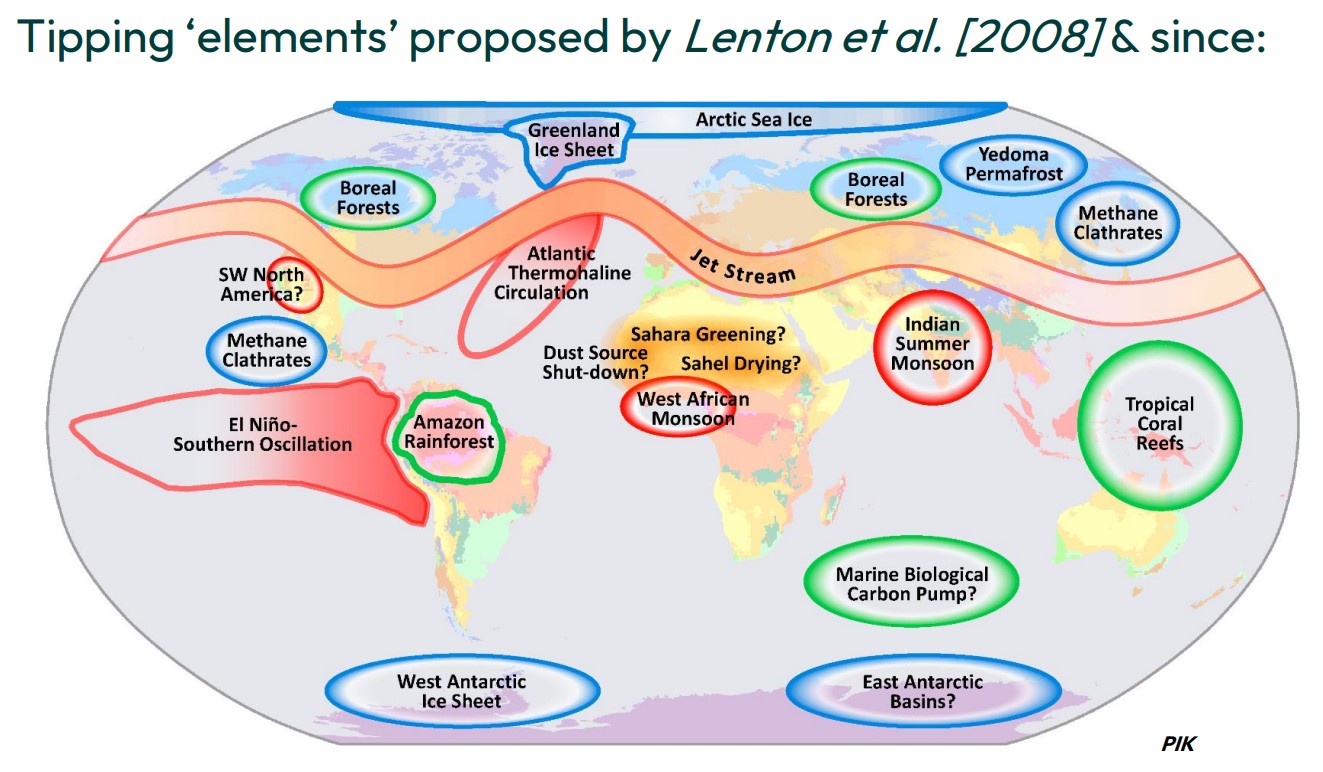Tim Lenton
Professor of Climate Change and Earth System Science, Global Systems Institute,
University of Exeter
Johan Rockström
Director of the Potsdam Institute for Climate Impact Research
Ricarda Winkelmann
Founding Director of the Max Planck Institute of Geoanthropology and Earth Resilience Science Unit Chair, Potsdam Institute for Climate Impact Research
Jul 3, 2025
Conference Statement
Global warming is projected to exceed 1.5°C within a few years, placing humanity in the danger zone where multiple climate tipping points pose catastrophic risks to billions of people. Already tropical coral reefs have crossed their tipping point and are experiencing unprecedented dieback, impairing the livelihoods of hundreds of millions who depend on them. Current warming has activated these irreversible changes and every fraction of additional warming dramatically increases the risk of triggering further damaging tipping points.
 These include a collapse of deep water formation in the Labrador-Irminger Seas triggering abrupt climate changes that reduce food and water security in northwest Europe and West Africa. Particularly alarming is the risk of collapse of the Atlantic Meridional Overturning Circulation (AMOC), which would plunge northwest Europe into prolonged severe winters, while radically undermining global food and water security. The Amazon rainforest is also at risk of widespread dieback from the combined effects of climate change and deforestation.
These include a collapse of deep water formation in the Labrador-Irminger Seas triggering abrupt climate changes that reduce food and water security in northwest Europe and West Africa. Particularly alarming is the risk of collapse of the Atlantic Meridional Overturning Circulation (AMOC), which would plunge northwest Europe into prolonged severe winters, while radically undermining global food and water security. The Amazon rainforest is also at risk of widespread dieback from the combined effects of climate change and deforestation.
The window for preventing these cascading climate dynamics is rapidly closing, demanding immediate, unprecedented action from policymakers worldwide, and especially from leaders at COP30. This is a human rights and planetary health imperative and ultimately a matter of survival.
Critical to preventing climate tipping points is minimizing both the magnitude and duration of temperature overshoot above 1.5°C. Every year and every fraction of a degree above 1.5°C matters. To minimize overshoot, global greenhouse gas emissions must be halved by 2030 compared to 2010 levels, requiring an unprecedented acceleration in decarbonisation. Only that way can the world reach net zero emissions in time to peak global temperatures well below 2°C and start returning back to, and then below, 1.5°C. This will also require scaling of sustainable carbon removal from the atmosphere.
Current Nationally Determined Contributions (NDCs) and binding long-term targets will only limit global warming to around 2.1°C. We therefore call on all nations updating their NDCs for the September 2025 deadline to set targets consistent with minimising overshoot of 1.5°C.
To achieve such targets we join the COP30 Presidency in calling on governments to enact policies that help trigger positive tipping points in their economies and societies, which generate self-propelling change in technologies and behaviours towards zero emissions. We also support the Global Mutirão initiative to catalyse collective action from civil society to help trigger positive tipping points to achieve common climate goals.
To trigger positive tipping points that help eliminate the 75% of greenhouse gas emissions linked to the energy system, and transition away from fossil fuels in a just, orderly, and equitable manner, we call on policymakers to adopt (and enforce) ambitious policy mandates to phase in clean technologies and phase out fossil fuelled ones. These include bans on the future sale of petrol/diesel cars, diesel trucks, and gas boilers. For less mature technologies such as green hydrogen, green ammonia and green steel, we call for increased investment in research, development and deployment.
To trigger positive tipping points that help eliminate the 25% of greenhouse gas emissions linked to food, farming, and deforestation, we call on policymakers to adopt trade policies that catalyse sustainable commodity production and to shift public money from the livestock sector to plant-based proteins. This will also help limit the risk of tipping points in the biosphere – including dieback of the Amazon rainforest – and can liberate land for regenerating nature.
To trigger positive tipping points of nature regeneration that scale up sustainable removal of CO2 from the atmosphere, we call for policy and civil society action to protect indigenous rights, support community-led conservation initiatives, and ensure fair and transparent valuing of nature. This will help achieve the Kunming-Montreal Global Biodiversity Framework targets to restore 30% of degraded ecosystems and conserve 30% of land, waters and seas. It is essential to limiting overshoot of 1.5°C.
Only with such decisive policy and civil society action can the world tip its trajectory from facing unmanageable climate tipping point risks to seizing positive tipping point opportunities.
Endorsed by
Alejandro Hermoso, University of Bern
Andrew Cunliffe, Oppenheimer Associate Professor of Geography, University of Exeter
Andy Richards, Global Systems Institute, University of Exeter
Anne Urai, Leiden University, The Netherlands
Ann-Kathrin Petersen (Climate Analytics)
Antony Philip Emenyu, University of Exeter
Axele Tanner Student Member of the Institute and Faculties of Actuaries Actuarial Analyst at Munich Re Group
Beatriz Arellano-Nava, University of Exeter
Bernardo Flores, Jurua Institute
Bettina Schwarzen, Zurich University of Applied Sciences ZHAW
Bob Walley, University of Exeter, University of Lancashire, Envirolution Cooperative
Boris Wieczorek, University of Bologna
Brynn O’Brien, Executive Director, ACCR
Carlos Nobre, University of São Paulo, Co-Chair of the Science Panel for the Amazon
Caroline Wallington, Centre for Sustainability Transitions, Stellenbosch University, South Africa
Cat Payne, Senior Climate Resilience Manager, Verture
Cesar Augusto Murad Rodriguez, University of Southampton
Chair, Winterbourne and Frome Valley Environmental Group
Chris Bauch, University of Waterloo
Chris Brown, Climatise
Chris Guilot, Awarenearth
Chris Nichols, Founding Partner GameShift
Chris Yesson, Zoological Society of London
Claire Sharrock, Producer, Open Planet
Daniel Heyen, University of Kaiserslautern-Landau
Dave-Inder Comar, Just Atonement Inc.
David Gale, Gale & Snowden Architects
Desislava Petrova, Barcelona Institute for Global Health
Dianty Ningrum, Anthropocene Laboratory
Dirk Scheer, KIT-ITAS, Germany
Dr Aliénor Lavergne, Senior Editor for Nature Geoscience, Springer Nature
Dr Ben Hudson, University of Exeter
Dr Cristina Ruiz Villena, National Centre for Earth Observation, University of Leicester
Dr Dimitri Lafleur, ACCR
Dr Ed Gasson, University of Exeter
Dr Ekaterina Popova, National Oceanography Centre
Dr Jeremy Walton, Met Office
Dr Laura Fogg Rogers, Associate Professor Engineering in Society, University of the West of England, Bristol
Dr Samantha Lavender, Pixalytics Ltd
Dr Steven Lade, Australian National University
Dr Tim Jones, Community Energy Plus
Dr Udo Engelhardt, Coral Reef Ecologist & Climate Science Communicator; Chief Scientist at The Climate Task Force, Ansvar 2030; EU climate Pact Ambassador
Dr. Courtney Howard, Emergency Physician, Founding Chair POWER: PlanetaryHealth Organizations for Wellbeing, Equity, and Regeneration, Canada.
Dr. Hans-Martin Füssel
Dr. Jacques Bara, University of Bonn
Dr. Jesse F. Abrams, Global Systems Institute, University of Exeter
Dr. Jonathan F. Donges, Potsdam Institute for Climate Impact Research
Dr. Tarje Nissen-Meyer, Professor in Environmental Intelligence, Department of Mathematics and Statistics, University of Exeter, UK Director, Earth Rover Program, London, UK
Eva Royo Gelabert, European Environment Agency
Felix Rodenjohann, Climate Pact Ambassador
Femke Nijsse, University of Exeter
Floor Alkemade, Eindhoven University of Technology
Frank Dentener Joint Research Centre, Italy
Freya Russell, Bournemouth University
Friederike Fröb, University of Bergen
Gareth Jones, Centre for Net Zero
Gauthier Martens, UCLouvain Saint-Louis Bruxelles
Gemma Bale, University of Cambridge and Advanced Research and Invention Agency UK
Gianluca Grimalda, University of Passau
Gwilym Owen, Emergency Planning and Resilience, Cardiff Council
Halle Krieger, upcoming PhD student at University of Exeter
Hannah Mulder, Associate Artist Northcott Theatre Exeter and theatre maker.
Hannah Nissan, Science and Advisory Director, Howden Insurance, Visiting Senior Fellow, Grantham Research Institute, LSE
Harald Desing, Empa, Switzerland
Harry Williams, University of Exeter
Hazel Jeffery, National Centre for Atmospheric Science
Helen Millman, University of Exeter
Ian Burton, University of Exeter
Inge Relph, Exec Director, Global Choices Foundation
Ioana Dima-West, AXA XL
Isobel Parry, University of Exeter
J. David Tabara, Autonomous University of Barcelona & Global Climate Forum
Jakob Harteg, Potsdam Institute for Climate Impact Research
Jemilah Mahmood, Sunway Centre for Planetary Health Malaysia
Jo Crocker, Winchester Action on the Climate Crisis
Joan Forehand, Concerned Citizen
Jonathan Gosling, Pelumbra Ltd
Jonathan Rosser, London School of Economics
Joshua Buxton, Global Systems Institute, University of Exeter
Juliane Mirow, Junior Researcher in Climate Change and Health
Katharine Lewis, Cornwall Climate Action Network
Kit Vaughan
Larissa van der Laan, University of Copenhagen
Liam Bullock, Geological and Mining Institute of Spain
Liz Gadd, freelance
Lucas Ferreira Correa, LMU Munich
Lukas Torscht, Roskilde University
Madhumitha Ardhanari, University of Exeter and Queensland
Madleen Grohganz, NIOZ
Manjana MILKOREIT, University of Oslo
Marten Scheffer, Wageningen University
Michael Weiss, Carleton University
Milena Holmgren, Wageningen University, The Netherlands
Nadine Rose, Real World Impact Ltd
Natasa Kovac, Ministry for the Environment, Climate and Energy, Slovenia
Neel Le Penru, Imperial College London
Nick Stoop, Founder & CEO of Pangea Impact Investments
Nina Lenger
Noah Maurer, Imperial College London
Oliver Bettis, Institute and Faculty of Actuaries
Olivier Blumberger
Owen Gaffney, Earth4all, Copernicus Institute of Sustainable Development
Paula de Jong, Associate Researcher, Hochschule Fulda
Per Olsson, Stockholm Resilience Centre, Stockholm University
Peter Bunyard, Independent Writer and Scientist.
Peter Lefort, Green Futures Network, the University of Exeter
Please include Durwood Zelkes suggestion of action on SLCP as a priority for immediate action Cat Payne, Verture
Prof Dr Jr Fenna Blomsma, University of Hamburg
Prof Peter Cox, Director of the Global Systems Institute, University of Exeter
Prof. Simon Willcock, Bangor University & Rothamsted Research
Professor Mark Lawrence, University of Adelaide
Professor Stefan Rahmstorf, University of Potsdam
Rafael Bernardi, CURE, Universidad de la República, Uruguay.
Reik Donner, Hochschule Magdeburg-Stendal, Germany
Richard Sulley, The Grantham Centre for Sustainable Futures
Rita Guerreiro Teixeira, Assistant Professor of Public International Law, Utrecht University
Ronny Rotbarth, University of Freiburg
Rosa Roman. TUM
Rune Baastrup, Democracy X
Ruth R Chapman, NBI, University of Copenhagen
S Bannon, University of Sussex
Sam Jackson, Ecologi
Sandrine Dixson-Declève, Co-President, The Club of Rome
Sandy George, BSc(Hons) Design & Innovation (Environment); Sustainable Homes Adviser at Community Energy Plus, and member of Roseland Environment Action Community Team, acting in personal capacity.
Sarah Hülsen, Institute for Environmental Decisions, ETH Zurich
Selim Haj Ali, Postdoctoral Fellow at the Global Systems institute, University of Exeter
Shalyn Wilkins
Simón Ladino Cano – PhD Candidate at EPFL
Sir Henry Studholme, Farmer, Forester and forest researcher
Sonny Mumbunan, Climate Policy Lab, Faculty of Social Sciences at Indonesian International Islamic University (UIII) and Center for Climate and Sustainable Finance University of Indonesia (CCSF UI).
Sophy Oliver, National Oceanography Centre
Stefania Asta Karlsdottir, University of Oxford
Stefano Caserini University of Parma, Italy
Steven George, European Space Agency (ESA)
Susanna Corti – Director of Research -Institute of Atmospheric Sciences and Climate – National Research Council of Italy.
Tatjana Baleta, Wikimedia Fellow for Climate at the Global Systems Institute
Theo Cox, Demos Helsinki
Thijs Christiaan van Son, Ecofluent, Cooling the Climate
Tim Hodgson, personal endorsement
Tim Quine, University of Exeter
Timothy Foster, University of Southampton
Tokuta Yokohata, National Institute for Environmental Studies
Tom Diebel, PKU Yenching Scholar
Tom Powell, University of Exeter
Tony Burdon, supporting IFOA Planetary Solvency work, ex-CEO Make My Money Matter
Tony Siantonas, Director of Regenerative Business, TechnoServe
Tsungrojungla Walling, Indian Institute of Science
Veronica Pizziol, University of Bologna
Viktoria Spaiser, University of Leeds
Violetta Ritz
Vivien Reh, University of Eastern Finland
Yan Campioni Cavalcante Dantas, Master student at Federal University of Pará
Yiannis Kranidiotis
We remind our readers that publication of articles on our site does not mean that we agree with what is written. Our policy is to publish anything which we consider of interest, so as to assist our readers in forming their opinions. Sometimes we even publish articles with which we totally disagree, since we believe it is important for our readers to be informed on as wide a spectrum of views as possible.











